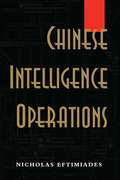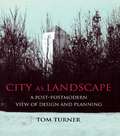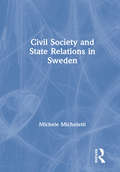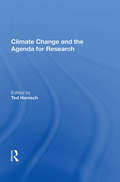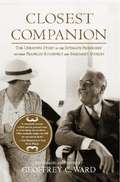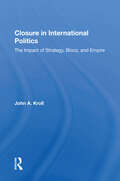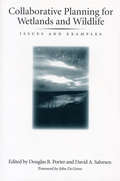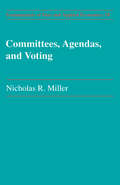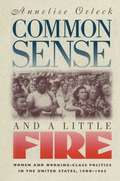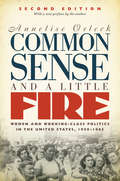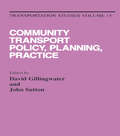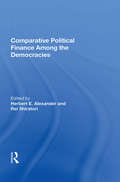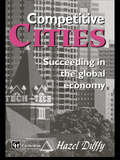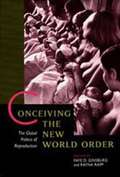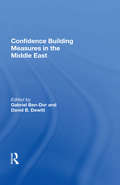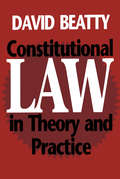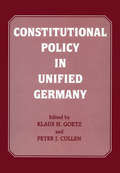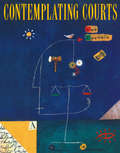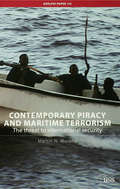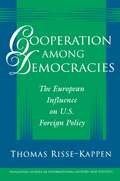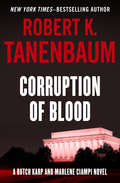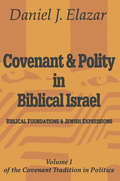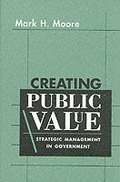- Table View
- List View
Chinese Intelligence Operations: Espionage Damage Assessment Branch, US Defence Intelligence Agency ("ta Chia Hsiao Shuo" Ksi Lieh Ser.)
by Nicholas EftimiadesNicholas Eftimiades examines the infiltration of Chinese espionage agents into foreign governments and private businesses. He specifically addresses the human source in intelligence operations, and how these tactics fit into the conduct of internal and foreigh affairs in China.
City as Landscape: A Post Post-Modern View of Design and Planning
by Tom TurnerIn twenty essays, this book covers aspects of planning, architecture, urban design, landscape architecture, park and garden design. Their approach, described as post-postmodern, is a challenge to the 'anything goes' eclecticism of the merely postmodern.
Civil Society and State Relations in Sweden
by Michele MichelettiSweden, as many other prosperous nations, is presently reassessing its national goals, political culture and collective identity. Newer groups in society are demanding equal treatment, and others whose struggles for recognition are older and unwon, are successfully mobilizing support for political change. Social democratic political hegemony has been eroded and other new political forces are now reinterpreting past political ideas and methods of action and a need for historical perspective. This book analyses the history of Swedish civil society. Social movements and interest organizations have played crucial roles in Sweden. Their history is also Swedish history and concerns struggles for political recognition and welfare state development and cutbacks. Theoretical developments within sociology, social psychology, public choice and political science are combined to enrich the analysis. Some of the theoretical elements used in this book are organizational waves of development, organizational life cycles, political opportunity structure, and topologies of collective action organizations. The book analyzes Swedish civil society history from the Midas to the 1990s. Swedish civil society history is divided into six periods. The role played by collective action organizations in the important developments in politics, society and economy in this one hundred and fifty year period are described, compared and analyzed. The primary focus is the impact of change brought about by these developments on collective action organizations.
Climate Change And The Agenda For Research
by Ted HanischThis book presents essays that address the most strategic questions and challenges to scientists and policymakers on the important subject of climate change based on issues discussed at the 1992 Earth Summit. It considers how best to meet the challenge that atmospheric pollution poses worldwide.
Closest Companion: The Unknown Story of the Intimate Friendship Between Franklin Roosevelt and Margaret Suckley
by Geoffrey C. WardThe highly acclaimed, remarkably intimate, and surprisingly revealing secret diary of the woman who spent more private time with FDR than any other person during his years in the White house. At once a love story and a major contribution to history, it offers dramatic new insights into FDR--both the man and the president. <P> * Intimate portrait of a president: FDR trusted Margaret "Daisy" Suckley completely--she was allowed to photograph him in his wheelchair, was privy to wartime secrets, and documented his failing health in great detail. <P> * Major contribution to history: Daisy's diary offers unique insights into FDR's relationship with Winston Churchill and other wartime leaders, his decision to run for an unprecedented fourth term, and his hopes for the postwar world.
Closure In International Politics: The Impact Of Strategy, Blocs, And Empire
by John A. KrollOpenness in the international economy happens when countries employ the commercial policies needed to mould free trade into an outcome that serves their national interests. With this conclusion, John Kroll challenges previous attempts to explain movements between free trade and economic closure solely in terms of domestic politics, international distributions of power, or market crises. He demonstrates that the final outcome of economic cooperation or conflict is more complex, determined both by the anarchical structure of international politics and by the policies nations employ to cope with that anarchy. Establishing a theoretical framework that links commercial policies to systemic outcomes, Kroll is able to offer a unique solution to the current debates over trade policy. He takes the major elements of that debate such as calls for aggressive reciprocity, enhanced multilateralism, and expanded trading blocs and establishes how and why each of these policies can influence the stability or instability of free trade systems. Kroll reviews how the GATT has enhanced free trade in the past by institutionalizing some of those policies and explains how GATTs failure to implement other policies will leave it ill equipped to handle future challenges. Kroll combines trade theory and recent works on anarchical cooperation, thereby responding to two recent admonitions in the international relations literature: He eschews ad hoc hypotheses in favor of ones derived from deductive models, and he moves game theory analysis beyond modelling and into the derivation of falsifiable propositions. In the latter book chapters, the author tests his proposition against a case study of British and German behavior during the collapse of free trade in the late nineteenth century.
Collaborative Planning for Wetlands and Wildlife: Issues And Examples
by Douglas R. Porter Leah Haygood Mary Jean Matthews Mark B. Adams Ed Finder David SalvesenCollaborative Planning for Wetlands and Wildlife presents numerous case studies that demonstrate how different communities have creatively reconciled problems between developers and environmentalists. It answers questions asked by regulators, environmentalists, and developers who seek practical alternatives to the existing case-by-case permitting process, and offers valuable lessons from past and ongoing areawide planning efforts.
Committees Agendas & Voting
by Nicholas R. MillerFirst published in 1995. The text is technically precise but at the same time accessible, and is carried forward by numerous examples. The chapters focus on vote counting rules, voting agendas, voter preferences, sincere and sophisticated voting strategies, solution sets, voting outcomes, agendas control, and agenda formation. The author himself has made prior research contributions to a number of these topics.
Common Sense and a Little Fire
by Annelise OrleckThis book has its roots in the memories and stories of my grandmother, Lena Orleck, a sharp-tongued woman with a talent for survival and for dominating every she met.
Common Sense and a Little Fire, Second Edition: Women and Working-Class Politics in the United States, 1900-1965 (Gender and American Culture)
by Annelise OrleckOver twenty years after its initial publication, Annelise Orleck's Common Sense and a Little Fire continues to resonate with its harrowing story of activism, labor, and women's history. Orleck traces the personal and public lives of four immigrant women activists who left a lasting imprint on American politics. Though they have rarely made more than cameo appearances in previous histories, Rose Schneiderman, Fannia Cohn, Clara Lemlich Shavelson, and Pauline Newman played important roles in the emergence of organized labor, the New Deal welfare state, adult education, and the modern women's movement. Orleck takes her four subjects from turbulent, turn-of-the-century Eastern Europe to the radical ferment of New York's Lower East Side and the gaslit tenements where young workers studied together. Orleck paints a compelling picture of housewives' food and rent protests, of grim conditions in the garment shops, of factory-floor friendships that laid the basis for a mass uprising of young women garment workers, and of the impassioned rallies working women organized for suffrage. Featuring a new preface by the author, this new edition reasserts itself as a pivotal text in twentieth-century labor history.
Community Transport: Policy, Planning and Practice
by John Sutton David GillingwaterThis book explores the strategic significance of community transport, identifies and analyses the key issues which face community transport, and presents an analytical and evaluative account of the role, status and future of community transport.
Comparative Political Finance Among The Democracies
by Herbert E. Alexander Rei ShiratoriThis book is an in-depth exploration of political finances in and among mature and developing democracies of the world of politics in most continents: Japan and South Korea in Asia; Brazil in South America; Mexico and the United States in North America; and Italy, Germany, and Spain in Europe.
Competitive Cities: Succeeding in the Global Economy
by Hazel DuffyCompetitive Citites is an assessment of the way in which `partnership', a word much used by politicians, has helped to shape the economic futures of four cities on both sides of the Atlantic - Atlanta, Toronto, Birmingham and Rotterdam.
Conceiving The New World Order: The Global Politics Of Reproduction
by Faye D. Ginsburg Rayna RappThis groundbreaking volume provides a dramatic investigation of the dynamics of reproduction. In an unusually broad spectrum of essays, a distinguished group of international feminist scholars and activists explores the complexity of contemporary sexual politics around the globe. Using reproduction as an entry point in the study of social life and placing it at the center of social theory, the authors examine how cultures are produced, contested, and transformed as people imagine their collective future in the creation of the next generation. <p><p> The studies encompass a wide variety of subjects, from the impact of AIDS on reproduction in the United States to the aftereffects of Chernobyl on the Sami people in Norway and the impact of totalitarian abortion and birth control policies in Romania and China. The contributors use historical and comparative perspectives to illuminate the multiple and intersecting forms of power and resistance through which reproduction is given cultural weight and social form. They discuss the ways that seemingly distant influences shape and constrain local reproductive experiences such as the international flows of adoptive babies and childcare workers and the Victorian and imperial legacy of eugenics and family planning.
Confidence Building Measures In The Middle East
by Gabriel Ben-dorConfidence Building Measures (CBMs) were pioneered in Europe at the height of the Cold War. The immediate goal of such measures is to create enough trust between parties in international conflicts to avoid mutually unfavourable-sometimes dangerous-outcomes due to misunderstandings. The long-term goal of CBMs is to move the contending parties closer
Constitutional Law And Politics: Volume Two Civil Rights And Civil Liberties
by David M. O'BrienConstitutional Law and Politics has more material—including case excerpts, concurring and dissenting opinions, and topical introductions—than any other casebook. Each case is set in its historical and political context, with social and technological factors relevant to the study of Supreme Court rulings noted throughout. Special feature boxes make constitutional law come alive with additional insights on the history, context, and personalities behind Supreme Court deliberations and decisions.
Constitutional Law in Theory and Practice
by David BeattyA comprehensive introduction to constitutional law, accessible to non- specialists as well as students of law and political science. Beatty (law, U. of Toronto) reviews the leading cases that have come before the Privy Council and the Supreme Court of Canada concerning the BNA Act and the Charter of Rights and Freedoms. He also reviews important decisions made by courts around the world, and analyzes the function judges perform in liberal-democratic societies when they enforce written constitutions that include bills of rights. Annotation c. by Book News, Inc. , Portland, Or.
Constitutional Policy in Unified Germany
by Klaus H. Goetz Peter J. CullenPrompted by unification, the German constitution has undergone the most fundamental re-examination since the foundation of the Federal Republic. This volume seeks to identify challenges which constitional policy faces and analyzes how, and with what degree of success, they are being met.
Contemplating Courts
by Lee J. EpsteinSeventeen thought-provoking essays in this sophisticated yet accessible reader demonstrate how political scientists conduct research on law, courts, and the judicial process, and at the same time answer interesting, substantive questions. Illustrating the breadth and depth of judicial politics studies, the essays convey to students the array of contemporary thinking -- both theoretical and methodological -- at work in the field. The book's five parts cover subjects taught in most judicial politics courses. Because each chapter stands alone, instructors have the flexibility of assigning less than the whole book or chapters in a different order. Topics examined range from information used by voters electing judges to the credibility of victims of sexualized violence. Accessible to both undergraduate and graduate students, Contemplating Courts offers fascinating views into both the law and courts field and the research process itself. Epstein provides in the first chapter an overview of the key elements of judicial process research and defines key terms. Technical notes and methodology appendices offer students additional guidance.
Contemporary Piracy and Maritime Terrorism: The Threat to International Security (Adelphi series)
by Martin N. MurphyDo piracy and maritime terrorism, individually or together, present a threat to international security, and what relationship if any exists between them? Piracy may be a marginal problem in itself, but the connections between organised piracy and wider criminal networks and corruption on land make it an element of a phenomenon that can have a weakening effect on states and a destabilising one on the regions in which it is found. Furthermore, it is also an aspect of a broader problem of disorder at sea that, exacerbated by the increasing pressure on littoral waters from growing numbers of people and organisations seeking to exploit maritime resources, encourages maritime criminality and gives insurgents and terrorists the freedom to operate. In this context, maritime terrorism, though currently only a low-level threat, has the potential to spread and become more effective in the event of political change on land. It is only by addressing the issue of generalised maritime disorder that the problems of piracy and maritime terrorism may be controlled in the long term.
Cooperation among Democracies: The European Influence on U.S. Foreign Policy (Princeton Studies in International History and Politics #183)
by Thomas Risse-KappenIn exploring the special nature of alliances among democracies, Thomas Risse-Kappen argues that the West European and Canadian allies exerted greater influence on American foreign policy during the Cold War than most analysts assume. In so doing, he challenges traditional alliance theories that emphasize strategic interactions and power-based bargaining processes. For a better understanding of the transatlantic relationship, the author proposes that we instead turn to liberal theories of international affairs. Accordingly, liberal democracies are likely to form the "pacific federations" described by Immanuel Kant or "pluralistic security communities" as Karl W. Deutsch suggested. Through detailed case studies, Risse-Kappen shows that the Europeans affected security decisions concerning vital U.S. interest during the 1950-1953 Korean war, the 1958-1963 test ban negotiations, and the 1962 Cuban missile crisis--all during a span of time in which the U.S. enjoyed undisputed economic and military supremacy in the alliance. He situates these case studies within a theoretical framework demonstrating that the European influence on decision-making processes in Washington worked through three mechanisms: norms prescribing timely consultations among the allies, use of domestic pressures for leverage in transatlantic interactions, and transnational and transgovernmental coalitions among societal and bureaucratic actors. The book's findings have important repercussions for the post-Cold War era in that they suggest the transatlantic security community is likely to survive the end of the Soviet threat.
Corruption of Blood: Corruption Of Blood, Falsely Accused, Irresistible Impulse, And Reckless Endangerment (Butch Karp and Marlene Ciampi #7)
by Robert K. TanenbaumA prosecutor goes after the truth about JFK&’s assassination in a New York Times–bestselling author&’s &“most enthralling legal thriller to date&” (Vincent Bugliosi). In a forgotten corner of the Georgetown library, New York prosecutor Butch Karp is about to commit a felony. He cracks the seal on a government file, in which he finds papers, a ledger, a reel of film, and a small jar that holds a chunk of human flesh. Just by looking at this material, he has broken the law. It&’s the evidence he needs to prove the true identity of the man who killed Kennedy, and now that he has it, Karp is the most dangerous man in America. Brought to Washington to assist in the Congressional investigation into Kennedy&’s death, Karp was expected to toe the line. As his personal inquiries lead him into a web that stretches from the capos of the mafia to the halls of the Kremlin, this hard-driving attorney realizes the conspiracy that killed Kennedy is still alive—and out for blood. As deputy chief counsel to the 1976 House Select Committee on Assassinations, Robert K. Tanenbaum has an insider&’s understanding of one of the darkest days in American history. Corruption of Blood is a novel inspired by real events by an author who &“knows his criminal procedure cold&” (Publishers Weekly). This ebook features an illustrated biography of Robert K. Tanenbaum including rare photos from the author&’s personal collection.
Courage and Air Warfare: The Allied Aircrew Experience in the Second World War (Studies in Air Power #Vol. 2)
by Mark K. WellsColonel Wells investigates the nature of aerial warfare and the men who took part. The book analyzes aircrew selection, reaction to combat, adaptability to stress, morale, leadership and combat effectiveness, and compares the efforts of the US Eighth Air Force and RAF Bomber Command.
Covenant and Polity in Biblical Israel: Volume 1, Biblical Foundations and Jewish Expressions: Covenant Tradition in Politics (The Covenant Tradition in Politics)
by Daniel J. ElazarIn this first volume of a trilogy, Daniel J. Elazar addresses political uses of the idea of covenant, the tradition that has adhered to that idea, and the political arrangements that flow from it,Among the topics covered are covenant as a political concept, the Bible as a political commentary, the post-biblical tradition, medieval covenant theory, and Jewish political culture.
Creating Public Value: Strategic Management in Government
by Mark H. MooreA summation of 15 years of research on what public-sector executives should do to improve the performance of public enterprises. Cases are used to illuminate their broader lessons for government managers.
